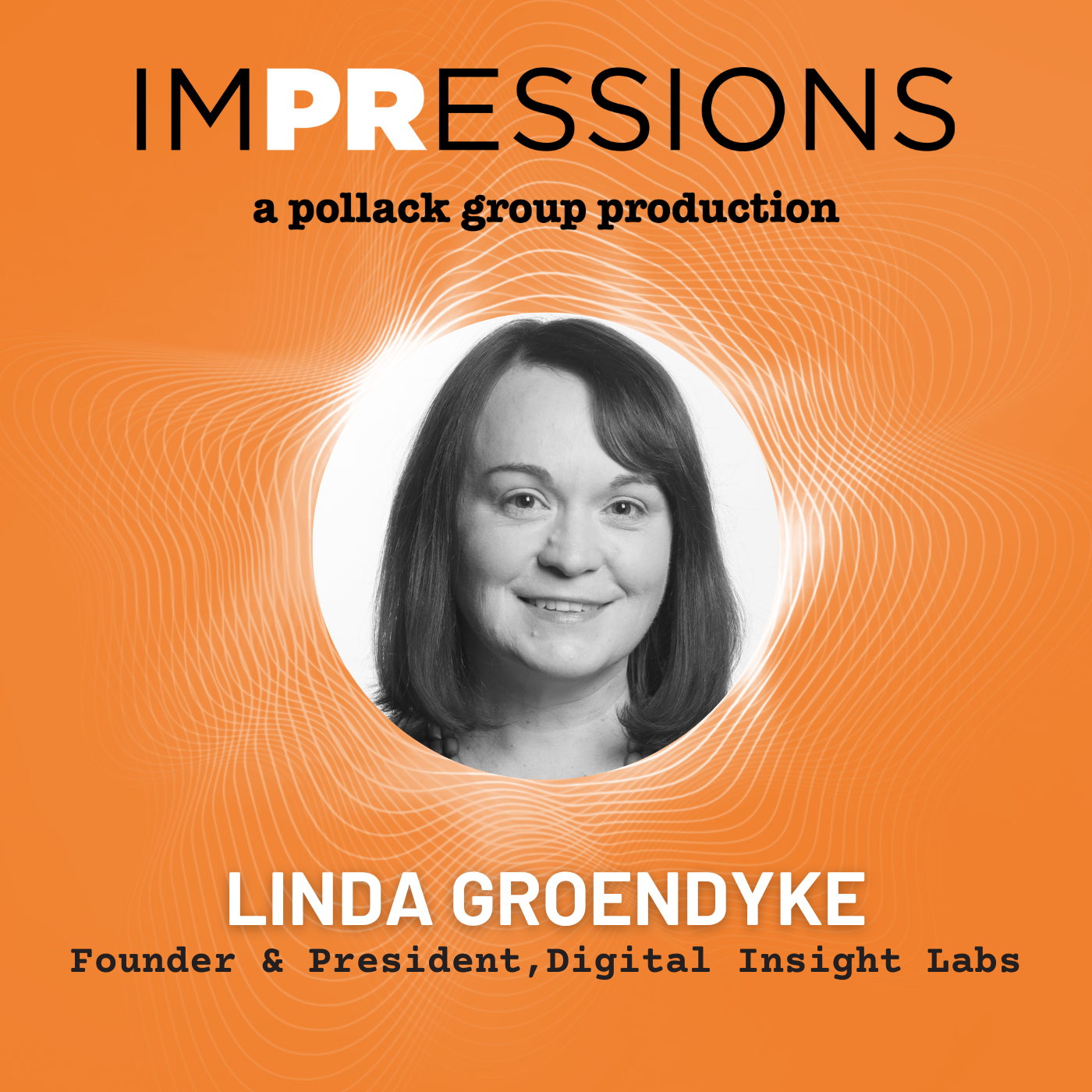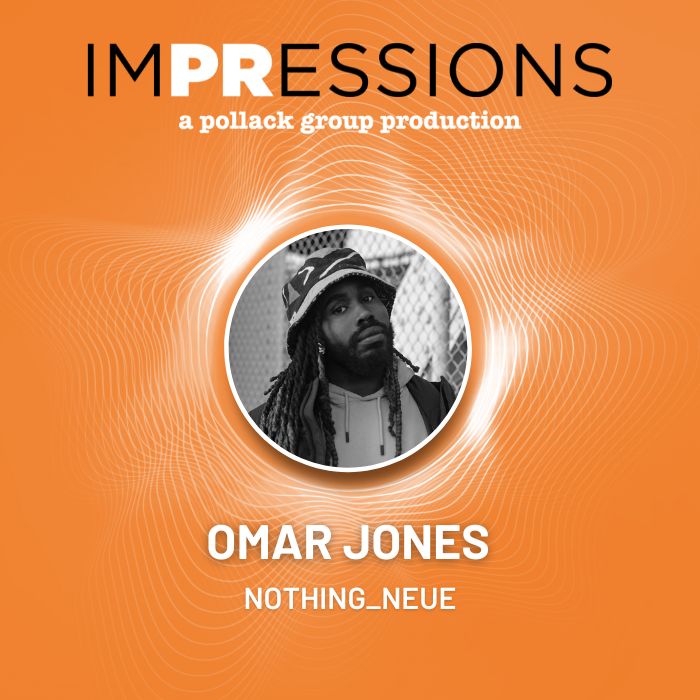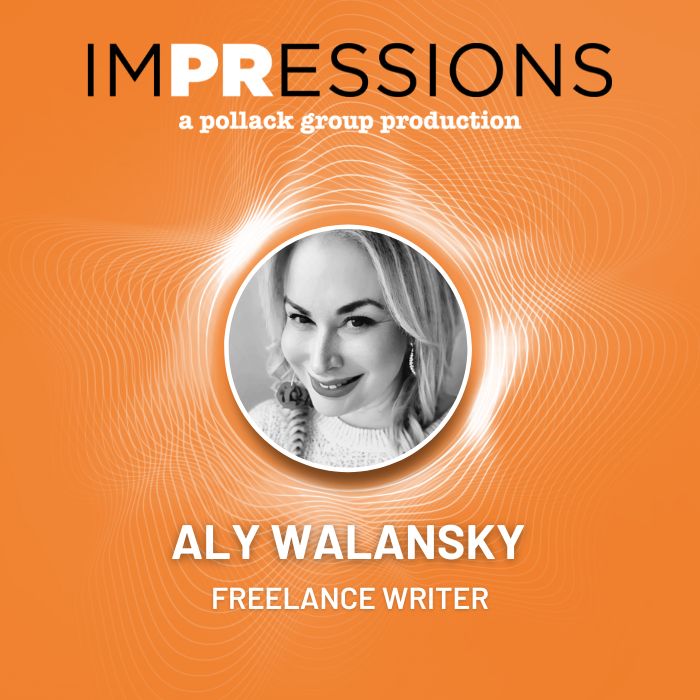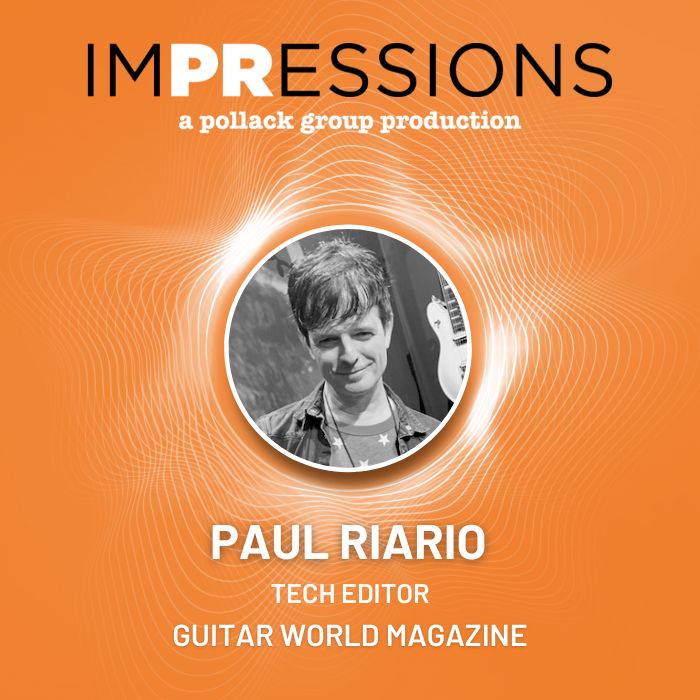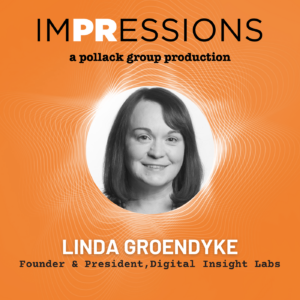 Does the phrase “SEO” send you into a spiral? Is the world of digital marketing a foreign language? You’re not alone. Episode 7 uncovers the art of SEO with Linda Groendyke, a 20-year veteran of the digital marketing industry. We dissect how to expertly craft creative online strategies using web analytics, SEO, user experience, and content, as well as some ingenious ways to utilize ChatGPT.
Does the phrase “SEO” send you into a spiral? Is the world of digital marketing a foreign language? You’re not alone. Episode 7 uncovers the art of SEO with Linda Groendyke, a 20-year veteran of the digital marketing industry. We dissect how to expertly craft creative online strategies using web analytics, SEO, user experience, and content, as well as some ingenious ways to utilize ChatGPT.
ImPRessions Episode #7 Transcript
Jenn: Traditional PR professionals are usually inexperienced in the world of SEO, as our efforts mainly fall within our media relations, building campaigns and drafting press materials. Optimizing our work through SEO seems a little bit intimidating. However, the irony is, most PR programs already include high-level SEO practices. We just don’t always realize it. Today we’ll be speaking with Linda Groendyke, who expertly crafts creative online strategies using web analytics, SEO, user experience and content to grow businesses. Thanks for joining us, Linda. We’re very excited to learn more about the fascinating world of SEO marketing.
Linda: Thank you guys for having me today.
Kalli: Of course. Of course. So as a PR professional like myself who focuses on earned media and working with journalists, writing press releases and pitches, you know, SEO is a little bit intimidating. It definitely falls outside of my comfort zone, even though it’s important to improve a brand’s online visibility. In your experience, how do these two worlds collide?
Linda: So I love this question because it really made me think. I think I just do this every day and make these assumptions. But the big thing about public relations is that what you’re really doing is creating and managing communications and content. And really, SEO is all about content, right? It is about the practice of different elements of technology and crafting a message to be found by the search engines. And just be clear in my mind, a search engine is not just Google or Bing, it’s also YouTube. And as you know, as we’re finding TikTok and Instagram, there’s different sources where people search for information. So content is basically at the core of both of those things, and that’s really where they intersect.
Jenn: Well, that’s a great approach to the next question, because one thing that you did mention to me on our previous call was how you’ve actually been utilizing Chat GPT as a research tool, which I thought was very fascinating. Can you tell us a little bit more about that?
Linda: Yeah, it’s actually been a big shift for me. So before if I would be writing, I would do a lot of research using the search engine, go out and find some different articles, and try to assemble some information on a topic. However, Chat GPT is a tool. It can do a lot of that for you. I really started thinking about it as kind of the way people are thinking about that [Assembling Information]. Encyclopedia has a lot of knowledge and can give you really a very structured overview of information, whereas the rest of the Internet doesn’t have so much structure to it. And I think the growth of it is that it is very easy to consume, write, and write in a very middle of the roadway. So from an SEO standpoint, if we know we want to write about specific topics and a lot of times I have to learn about new topics. And so for me, looking at GPT really allows me to get a condensed version of a topic and then I can do some additional research from an SEO standpoint in something like Google.
Jenn: Do you use it to actually craft copy or is it merely just an educational tool?
Linda: So for blog posts, probably more than anything else, I use it to do the structure of it. And then really, I mean, as you guys know, with public relations, every client you have has their own brand and their own voice, the way they talk about their products or their issues. So I really use it to create structure and then I just go and then write it from using that structure to then write blog posts very often. Because instead of going out and starting with the blank page, I start with the pages filled in and just recraft the message around the topics that are most important for my client, and then also with their brand voice in the tone that they need.
Kalli: That’s really amazing. So in addition to Chat GPT in your work, what other tools do you typically use that you recommend for those looking to enhance their company or their clients’ SEO presence?
Linda: Yeah, so there’s a lot of tools that Google has. I mean, Google has, you know, Google Analytics, Google Data Studio; the one I think from an SEO standpoint that a lot of people overlook is something called Google Search Console. It is actually a tool that gives you insight into how they’re viewing your website and how they’re indexing it. So it includes technical information, like if you don’t have your page programmed correctly or if you can’t crawl that page or if it’s a duplicate piece of content, Google will give you insights into all of that. But it will also show you the keywords that you’re ranking for. So the really great thing is if you are trying to rank for a topic like tennis shoes, right, you can see if you’re ranking for the word tennis shoes, how many times your website has an impression on Google, and how often your users are clicking for you. So, you know, from a public relations standpoint, when you’re working with the company, it’ll tell you what that company is being seen for in the search engine. They’re just visibility in that world. And then also how attractive it is, what you’re saying in that, you know, in your web pages to your users, that’s how often they get clicked through. So, you know, that’s one of the best tools, and it’s absolutely free.
I have another tool that I use called Semrush. There’s a lot of these tools. MAS has a tool. There’s a lot of different ones. I use Semrush to do keyword research. I do it to do some page evaluations. There’s also what they call brand listening tool, so you can put the name of your brand in there. And it will tell you when they spot web pages that have your brand name on it or links to your website. So Semrush is for what I do every day. It’s great. It also has technical auditing capabilities. So there’s a big component of technology and development that goes along with SEL, and that for people is like a big lift, right? It’s really intimidating. Like if you write content for a living, knowing how to program a website is not necessarily what you want to be thinking about, but there are tools to tell you like links are broken or this isn’t programmed correctly, and then it’ll help you coordinate it with your development resources to, you know, try to fix those things and improve your performance in the search engine. So I highly recommend checking out Semrush, at least the free version. There’s lots of great tools in there that span the whole world of content.
Jenn: I actually want to stay on Google for one second, or rather actually go back to it. I know that you’ve been seeing some interesting trends in the last few years, specifically noticing the volume of search declining, as well as broad topics being omitted from the platform. I know one theory you and I talked about is that more users are actually utilizing TikTok to answer questions. Do you believe this to be true? And if so, why do you think more people are looking towards a social media platform over Google for information?
Linda: Yeah, there’s some great research that came out recently that a lot of people who are Millennials, Gen Z, you know, that younger generation who have really shifted their usage away from search engines and they’re finding that is climbing the demographic ladder kind of slowly over time as people get more comfortable with these platforms. And what we’re finding is that for big, broad things or sometimes instructional things, like if you watch a video on how to do something, it’s a purpose YouTube served for a really long time and still does. But TikTok is really starting to take over in that sphere. There’s a lot of technology. I think it’s very easy in a lot of ways to have a mobile phone and to have a really great TikTok channel. So there was really like a very, you know, not a big barrier to entry for that particular thing.
One of the things we talked about before “is a search going down?” and how do we really quantify that? People can say, well, more people are using TikTok. Well, I did a study for one of my clients recently who runs a medical school, and we had a target keyword list of the most important keywords for them that we are the most focused on. There’s about 250 keywords, and we did an exercise that looked at the average monthly volume. So for Google, what they do is they look at the previous 12 months, they average that out and they say this is the kind of the average volume of search in any one month. And we looked at where they were in November of 2022 and then also November of 2021. And for some big topics like medical school, we saw declines of, you know, 10 to 20% in the number of average monthly volume. So for really big broad topics and even for more specifically like applications for medical school, things that were even more long tail, we were seeing declines across those platforms. So I think those two pieces of data married together are just the moving of this younger generation and the consumption of more TikTok content. And it’s not every place, but in a lot of places, these broader topics, really losing volume of visibility is really compelling to say there is this big shift away from just only using Google.
Jenn: And I think it’s the algorithm, too that we talked about. TikTok, apparently, and you’re the expert, but from what I gather, TikTok has an incredible algorithm I think that is far superior than Google’s. And I know, too, that there are certain communities that have voiced-and I actually wrote an article about this- have voiced that TikTok is actually more accessible to the LGBTQ plus communities, and people of color. They’re finding that they’re able to get answers that are more relevant to their demographics through TikTok, when searching for whatever their question may be, over Google. And I just thought that that was so, so fascinating.
Linda: Yeah, I think part of that is there’s like just the focus of what Google thinks of as content. I mean, so content- kind of just take a step back, what is content, right? Content is…writing content for your website, actual words on a page. It’s a video, it’s an audio file, it’s a podcast. And if you think about TikTok in the sense that you are constantly creating a conversation on TikTok with these videos, then it really does make sense, because you really quickly can get a conversation onto a video and onto TikTok channel. So you’re going to get more diversity, your technical knowledge to build a website, pay for a website, you know, there’s a barrier to entry to buy a URL, build a WordPress site, have design, know how to update on that stuff. Whereas with TikTok if you use your camera and you have a TikTok account, you do have this advantage to be able to propel content quickly into the search engine. Whereas with Google, you have to have your own entity that Google comes in, finds and then promotes through their search results page. So it makes a lot of sense that things are that are much more, you know, maybe not as mainstream, like LGBTQ plus content or really other specific niche areas that you’re going to find a lot more content because it’s easier to generate and it’s immediately available, right? So every piece of content that I get, they immediately index. Whereas Google it’s a little bit more of a challenge.
Kalli: That’s so interesting. And I know, just kind of pivoting off of TikTok, that you’re also a big fan of using Pinterest, and despite using it for wedding inspiration, you know, I know there’s so much more involved in the app than meets the eye. How do you use Pinterest for SEO purposes?
Linda: Yeah, so for Pinterest, there’s actually- and I think Pinterest to me is a little bit more niche, right? I’m not going to talk about really big industrial like bows and fittings in Pinterest. It’s not necessarily the right channel, but one thing I will say about Pinterest is they also use AI, right? Everyone’s talking about AI. You know, Google uses AI and Tik Tok uses AI. You know, Pinterest has a great AI platform, so they are very good at stringing together different types of interests. But I think the other areas that are great is really I use it for travel information. I mean, I think it’s like my go to source when I go to a city, the first thing I do is search for articles in about that city or things that bloggers have written. There’s a lot of travel bloggers out there. There’s a lot of people in the hospitality industry. If you’re interested in the food and beverage industry, that’s also a great one. Fashion. There’s a lot of CPG markets that have a really strong blogging presence, and Pinterest is great for that because, one, you can really build a lot of great boards, but it also develops inbound links, right? So they will link directly to your website. So it’s also a mechanism to gain a link through Google, which is important, but it’s also a way to just generate traffic that comes to your website as well. I do find that it’s amazing. Their search engine on Pinterest is incredible. I mean, you can’t find everything there, but I think for those CPG topics where it really shines- is a little bit forgotten, it gets overshadowed by, you know, Facebook and the TikTok’s of the world. But I candidly think there’s a lot of value in saying, “Oh, is there a play there?” I mean, you’re already creating content, you already have the imagery, you already have the links to your website. It really is another channel, just promoting yourself. And to get those inbound links, which are invaluable in Google’s algorithm.
Jenn: Well, as somebody who is getting married in two weeks, that’s good to know because it’s all I’ve been using Pinterest for, and I know that there’s so much more to it, I just have been very busy with something else.
Linda: They have a really robust ad platform as well. And I’ve been really exploring it. So one of my clients, they’re really trying to reach, you know, the mom set. And I think a lot of people go after the usual suspects of, you know, display ads or mommy blogger networks. Pinterest actually has a whole ad platform that’s on top of it as well. So I think sometimes you’ve got to realize you can advertise on Pinterest. So that’s another component. Having just talked to their reps the other day, it’s very, very robust and there’s a lot of demographic information and a lot of great targeting. So, you know, it’s great from an SEO standpoint, but I always like outlets that not only have SEO value but potentially have an extension of that, right? Some kind of ad component where you can bundle those things for your clients.
Jenn: So a little bit of a loaded question because I know that this can go down many different rabbit holes, but where do you see the industry heading?
Linda: I think it’s going to become, you know, what happened to cable. So, you know, back in the day, everyone just had their 300 channels of cable, and you had a cable box and that’s what you did. And now it’s completely different. You have a lot of streaming services, and they serve different purposes. And the dominance of those networks and the cable industry is just not going to be the same slice. It’s not just going to go away. There are some people who will totally unplug from Google and only use Chat GPT or use TikTok to go find their information. But I do think Google still can be dominant. You know, they haven’t added, in theory, TikTok to be considered a search engine because it doesn’t really drive you to your website, right? It’s its own encapsulated environment. I think the industry is going to have to rethink what it thinks of a search engine, and how you measure that. So I think that’s another component of it. But I really do think that it’s become much more niche, that different sites will serve different purposes. It will become a funnel, right? The how-to, the broad information, the general understanding might be overtaken completely by something like Chat GPT. And then, when you need to find the nitty gritty details and do more detailed research, you would turn to a search engine like Google or Bing.
Kalli: That’s really, really helpful. So Linda, do you have any last-minute SEO tips for our listeners, especially for those who may not be as familiar with the concept?
Linda: Yeah, so I think there’s probably two things I would say. We talked a little bit earlier about Google Search Console, and I really think it’s this free tool that gives you a lot of insight into what the search engine is thinking about. So it helps you learn a lot so when it tells you things are wrong, or you have errors, and how they’re promoting your keywords. It gives you a little bit of an understanding of how that whole algorithm works because that’s constantly changing. But that’s definitely a view into that world. And I would also say the other thing, at the end of the day-I do one on one SEO training courses- and the thing I always say to people is to write great content. It doesn’t matter what platform it’s on, whether it’s TikTok or Pinterest or if it’s on your own website to be indexed by Google. If you’re trying to push information as a public relations person out to a pub, it’s all about really good content. So write great content first and then figure out how to transform it enough to satisfy the needs of the platform that you’re on.
Jenn: Well, at least as pure professionals, we have that covered. Write good content first. At least we have that part-time.
Linda: And that’s the biggest challenge, right? I mean, I think people in PR-I often see there’s so many opportunities- but I think people in PR forget it all starts with the content. So, you know, when you’re a pro at that, really you have the biggest advantage.
Jenn: Absolutely. And I guess, you know when it really comes to understanding SEO, PR professionals now should no longer shudder at the idea of the two coexisting but rather embrace how SEO can combine with traditional PR methods to improve a brand’s online presence and reputation. Linda, thank you for walking us through how to better implement these practices into our work and how you uniquely utilize so many different apps and programs to excel in SEO. It’s been great speaking with you today.
Kalli: Thank you very much.
Linda: Thank you guys for having me on. So enjoyable. Always. I always love talking about SEO, so I had a great time.
Jenn: And we love learning about it, so thank you so much. For those listening, drop us a line any time at imPRession@pollackgroup.com. We look forward to seeing you all soon. Bye now.

